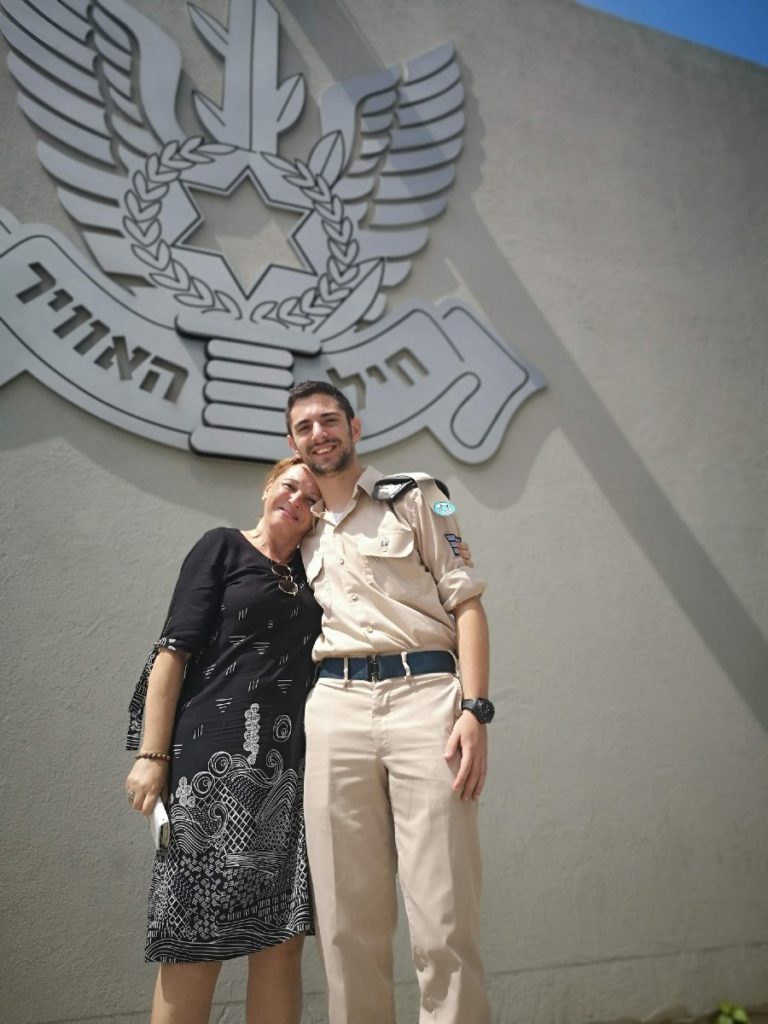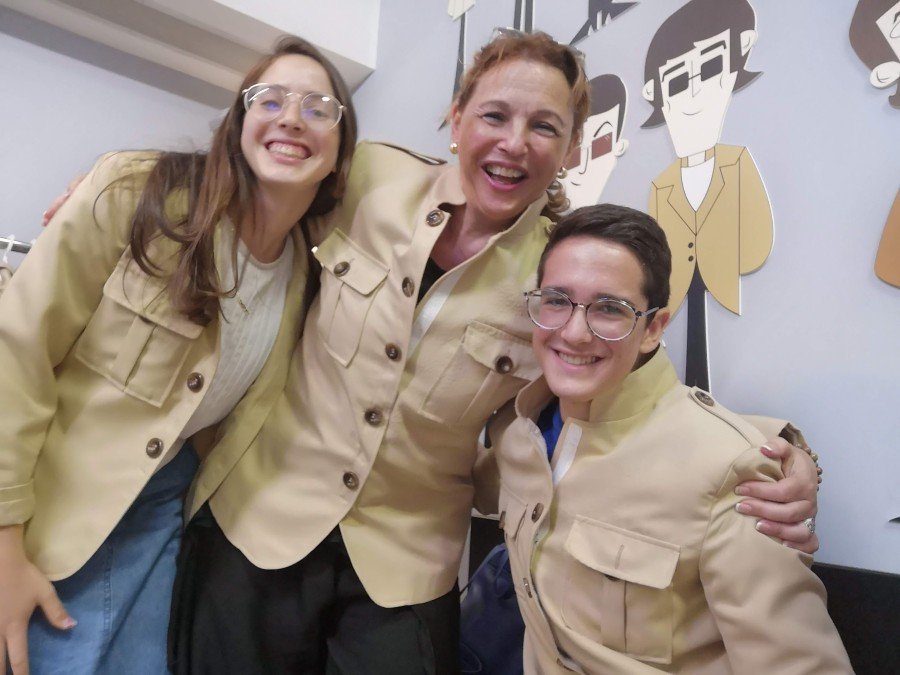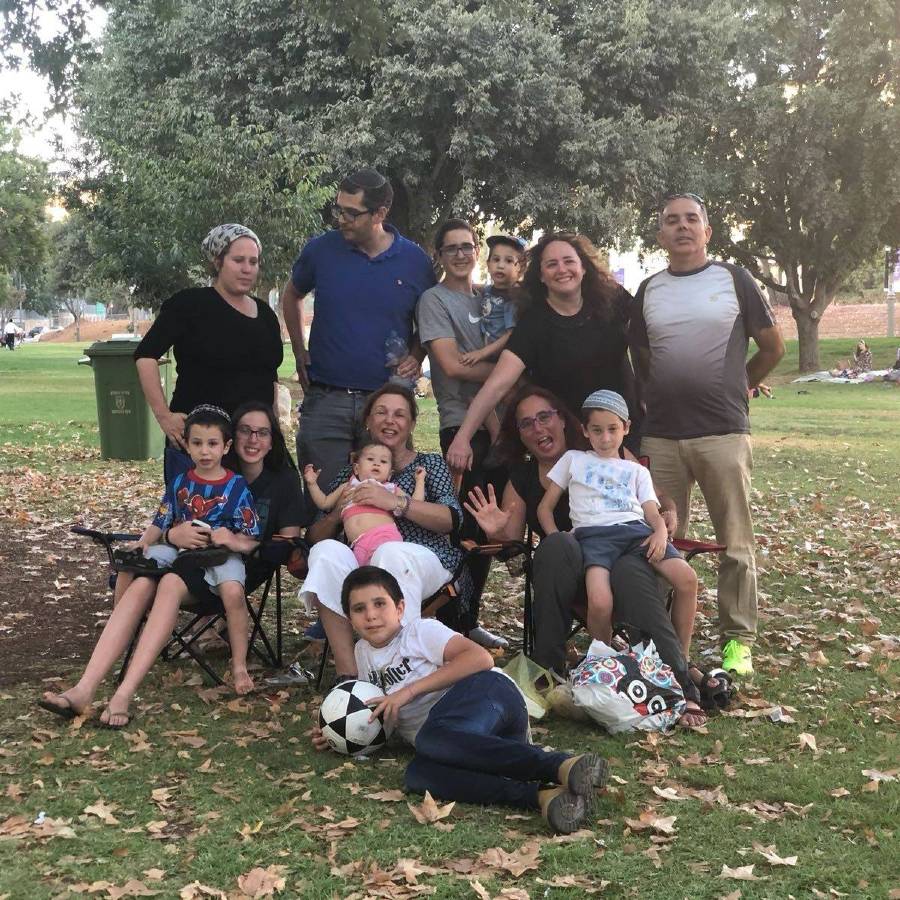
Face to face with Edith Blaustein
An interview with Shavei Israel’s deputy director, translated from the original Spanish, as it appeared in Semenario Hebreo Jai, the Jewish newspaper in Latin America. Interview by Janet Rudman
Tell us about yourself in a few words.
I am very honored that Semanario Hebreo wants to conduct an interview through you, dear Janet. It is really a great pleasure to reconnect with you and with the readers of the Semanario.
I was born in Montevideo in 1955, my parents immigrated in the late 1920s, my mother from Kobrin and my father from Chernovich. I have four children – Dina, Raquel, Shai and Yonatan, seven grandchildren and I am married to Dr. Yehuda Sczwartz.
I graduated from the Yavne Institute in 1972, I finished my history teaching at the Artigas Institute of Professors and obtained a Master’s degree in Education from the Catholic University.
I belong to the first generation of graduates of Leatid, a program of the Joint, in Buenos Aires. Later I did postgraduate studies at the Melton Institute of Education at the Hebrew University of Jerusalem. In addition, I am an ontological coach, I obtained the title at the institute directed by Dr. Rafael Echeverría at the Universidad del Desarrollo de Santiago de Chile.
I worked as a Hebrew History Teacher at the Yavne Institute and at the Comprehensive School. I directed the Center for Jewish Studies between 1982 and 1989. I was General Director of the Yavne Institute between 1991 and 1995. Later, already in Chile, I was General Director of the Vaad Hajinuj and the Hebrew Institute of Santiago de Chile between 2002 and 2008.
In 2008 I made aliyah with my son Yonatan, my children Raquel and Shai already lived here, Dina lives in Montevideo. We came to live in Jerusalem.
I have been working since late 2008 as deputy director of the Shavei Israel Foundation.
What was the CEJ for you? I want to tell our readers that they did not know him? What memory do you have of the publication Contextos?
Our meeting, Janet, was at the Center for Judaic Studies, an undertaking of the Dor Tzahir Department of the Jewish Agency in conjunction with the Universities of Jerusalem and Tel Aviv. It was a great honor to be appointed director of an adult education institution during a difficult time. Let us remember the context of dictatorship in Uruguay. A very important economic crisis also just in that year 1982. Study places were closed, so it was also a privilege for Uruguay to have that space. The Jewish community was greatly enriched by the Jewish Identity Program taught by the CEJ and lasted two years. The CEJ was, without a doubt, a beacon of light in every sense, a staff of high-level local teachers with guest teachers from Buenos Aires, the Hebrew University and the University of Tel Aviv. Famous were the Jewish Identity workshops that we conducted based on the life stories of the students.
I remember the value that the graduates gave to the final diploma, both community teachers and unforgettable students who passed through their classrooms go through my memory. Very enlightened adult people. Among the ventures we carried out at CEJ was Contextos magazine, with an editorial team of luxury students with articles, interviews, illustrations made with professionalism and love that influenced the community life of those times. And you, Janet, were part of that cute team.
Did you work in Jewish education in various Latin American countries? How was your experience?
An enriching experience that allowed me to learn about Latin American Jewish life. I want to highlight my Chilean experience as general director of the Vaad Hachinuch and the Hebrew Institute, a model school of around 1500 students. They were very intense years that allowed me to be part of the Chilean community and make close friends with whom I continue to be in contact to this day. I have a lot of affection for the Chilean community and I am very grateful for the opportunity I had to carry out projects and transform Jewish education in that community. The fact of having made the Hebrew Institute trilingual has been one of the foundations of its current success. I took the experience of Taglit to Chile, and also Hillel for young university students. We did an exchange program with a school in New Jersey. We added to the study trip to Israel a previous stop in Poland, in this way we raised the trip to a dimension of transformative experience for the students. We developed the Summer Week for the adult community, and an endless number of other projects. I remember when I retired from office to make Aliyah, I left thirty projects underway.
In what years did you work on the Yavne? How many students attended?
I was general director of Yavne between 1991 and 1995, at that time there were around 500 students. Very intense years in directing, where we programmed deep structural changes with the teaching team. Two memories that come to mind: when I called a father, young at the time, Dani Cohn and asked him to join the board of directors, all the rest is history, and when we brought the minian from the Bney Akiva School Integral, which operated in the Yamim Noraim, al Yavne, that was the basis of the successful minyan to this day in a beautiful Beit Knesset.
How was your adaptation to Israel professionally? And personally?
I made aliyah with the conviction that ¨Eretz Israel niknet al isurim¨, that is to say that the Land of Israel is achieved through sacrifice. I had ¨siata dishmaia¨, Divine help, in the klitá. Raquel was already married, she already had three children and Shie who came to live with Ionatan and me until she got married and today she already has four children. So my children were and continue to be a constant support that allowed me to acclimatize at home. Along the way I met wonderful people, including my husband, who together with my lifelong friends, the Rabbi and Rabanit Birenbaum, allowed Ionatan and me to have a very good klitá, not without difficulties, of course, but certainly successful.
Since 2008, I have worked as deputy director of Shavei Israel (www.shavei.org), a foundation created by Michael Freund, who made aliyah from New York. Michael, while serving as Netanyahu’s advisor in his first term as prime minister, received a letter from a group in Northeast India who recognized themselves as descendants of the Menashe tribe. In the letter they asked “their brother Yehuda” to help them reach Eretz Israel. Michael, unlike others who rejected the letter, decided to respond to them. From that letter he promised to do everything possible to bring them to Israel. And that is one of our tasks at Shavei Israel, where Michael is primarily in charge of fundraising and I am in charge of running the institution. We have departments that take care of Bnei Anusim (descendants of those who kept their Judaism a secret after the expulsion of the Jews from Spain), there are even those who want to fully return to Judaism and we help them, both those who live in Europe and in Latin America. Within this department, the Majon Miriam works, which accompanies the Spanish, Portuguese and Italian-speaking students in the conversion and the Majon Milton for English-speaking students.
The Chief Rabbinate of Israel is the one who sets the criteria for all this work. We also work with the hidden Jews of Poland, who hid their Judaism after the Shoah and today their grandchildren discover themselves Jewish and want to return to their roots.
We also work with the Subotniks in Russia and with the Kaifeng Jewish community in China. With the sponsorship of the Ministry of Culture, we created the Maani center, for the preservation of the culture of the different communities with which we are in contact, where we learn and share the various traditions that each community developed to preserve Judaism. So I have an exciting task.
We have already succeeded in bringing to Israel about 3,000 bnei menashe, who live in twelve cities in Israel. We create for them an absorption center for when they arrive in Israel, there we accompany them for three months so that they go through the conversion with the Daianim of the Rabbinate of Israel. Then we accompany them in their absorption in the different cities, when they are already installed.
I have already traveled to India several times to direct the “return operation”. On one of the trips it was my turn to bring a group of a hundred bnei menashe to Israel. The truth is, it is the closest thing to feeling Moshe Rabeinu for a few hours. The emotion is indescribable, they have a hymn that speaks of the hope of reaching the Land of Israel and Jerusalem, I always cry with emotion when arriving in Israel with that song and seeing how each one kisses the huge mezuzah that is at the entrance of the airport. At this time the government of Israel approved the arrival of 250 olim de bnei menashe and we are in full planning and organization, an Elal plane that we specially chartered will bring them and together with the Ministry of Absorption we will take care of their insertion into the previous Israeli society passage through the absorption center that we set up where the conversion takes place.
Without a doubt it is a privilege to be part of this important institution.
I know you are modern orthodox. I have a memory of the pre-cut toilet paper in the bathroom of your house on Shabbat. How is your life today in that sense?
My family, when I was born, was not religious, in fact until I arrived at Yavne in the first year of high school, and at Bnei Akiva, I did not know Hebrew. It was those institutions, which evidently shaped my life, that allowed me to fall in love with Judaism, study, and begin to perform mitzvot.
I adopted the Jewish algorithm, which Rabbi Jonathan Sacks (ZT´L) talks about, into my life. I believe with complete conviction that Judaism is a way of life full of meaning, there is not a day that I do not study a chapter of the Tanakh and now also the daily page of the Talmud, it is food for the soul.
What do you miss about Montevideo?
First of all, my daughter Dina who lives there, to my parents (Z´L) who are buried in the La Paz cemetery, I don’t miss anything specific but I certainly carry Montevideo in my heart. An interesting phenomenon is the language, Spanish, I have the happiness of being able to handle myself (read, write) in Spanish, English and Hebrew, but there are times when I miss Spanish, I want to see a movie or read a book because I speak Hebrew or English It is for me like being dressed for the street, and Spanish is being in slippers and with home clothes.
Your lifelong friends, from what origin are they and from what time of your life?
I have lifelong friends that I have been making in the different stages of my life, from Bnei Akiva, from CEJ, from Yavne, she was joined by Chilean friends who are incredible and lately also Israeli. I want to mention my friend Lea Cesarco, who I met at CEJ, with whom I am in contact all the time. Also to Cuca Sandbrand and Mary Fogjel, the list is really long thanks to G0d.
You were always a very hardworking woman. Inside the Jewish home …
When my children went to nursery school, they were taught that “Dad works and Mom cooks.” I don’t think anyone talks like that today. My children have seen me work all my life, with effort and they do too. My daughters are professionals, they have master’s degrees and work in important roles, my daughter-in-law too. I believe that Jewish women can be professionals in various fields. Even in Jewish life, in the synagogue there have also been many changes in the places women occupy as teachers, Talmud scholars, etc.
In Uruguay today we have a woman Vice President who was removed from the lists for fighting for women, Golda Meir was Prime Minister in 1969. Uruguay has more women in Parliament and, according to I have read, Israel has fewer in this legislature than in the previous one. What can you tell me about this?
Without a doubt, women in Israel occupy a very important place. You can see it in the media and also in politics. In relation to Uruguay, women here, in that sense, have more relevance. The Director General of the Israeli Aviation Industry is an engineer, these are roles that were not traditionally associated with women.
You are a grandmother. Tell me what it means to be a grandmother for you.
Being a grandmother for me is like receiving an award. For now I have seven grandchildren, the youngest has three and the oldest 18 (they are twins). They are all my pride. It is very special to be with them and enjoy them. Every Friday when we greet each other for Shabbat I tell them how much I love them and how proud I am of them. I confess that I exercise an active “grandmother”, I care about establishing routines, sometimes I organize peulot, like when I was madrijá. I like to go for walks, prepare meals for them, buy sweets, teach them Spanish, study together, things that they will certainly remember when, G-d willing, they are adults.













